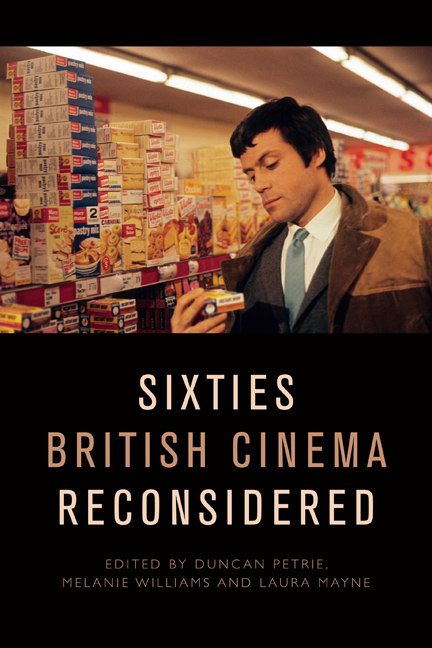Book contents
- Frontmatter
- Contents
- List of Figures and Tables
- Notes on the Contributors
- Introduction
- PART ONE STARS AND STARDOM
- 1 Male Stardom in 1960s British Cinema
- 2 ‘Rebel Rebel’?: Oliver Reed in the 1960s
- 3 Carol White: The Bardot of Battersea
- 4 ‘The Old Wave at Work’: The Transatlantic Stardom of the British Character Actress in the 1960s
- PART TWO CREATIVE COLLABORATIONS
- 5 Woodery-pokery: Charles Wood’s Sixties Screenwriting
- 6 ‘Beyond Naturalism’: Jocelyn Herbert, If . . . (1968) and Design for Performance in 1960s British Cinema
- 7 Kes: From Page to Screen
- 8 ‘I’d like to remember you as you are – as just a grumpy old man’: Joseph Losey and the Making of Figures in a Landscape (1970)
- PART THREE STYLE AND GENRE
- 9 ‘Wholesome rough stuff’: Hammer Films and the ‘A’ and ‘U’ Certificate, 1959–65
- 10 Widescreen Pyrotechnics: Shot Composition and Staging in the Cold War Films of Joseph Losey and Sidney J. Furie
- 11 The Rise and Fall of the Colourful Corporate Fantasy in 1960s British Cinema
- 12 Witchfinders and Sorcerers: Sorcery and Counterculture in the Work of Michael Reeves
- PART FOUR CULTURAL TRANSFORMATIONS
- 13 ‘An Impulse of Anger, Instantly Regretted’: Rebellion and Reaction in the Early-1960s Naval Film
- 14 Narratives of Race and Identity in Sixties British Cinema
- 15 Panic at the Disco: Brainwashing, Alienation and the Discotheque in Swinging London Films
- Index
9 - ‘Wholesome rough stuff’: Hammer Films and the ‘A’ and ‘U’ Certificate, 1959–65
Published online by Cambridge University Press: 22 September 2020
- Frontmatter
- Contents
- List of Figures and Tables
- Notes on the Contributors
- Introduction
- PART ONE STARS AND STARDOM
- 1 Male Stardom in 1960s British Cinema
- 2 ‘Rebel Rebel’?: Oliver Reed in the 1960s
- 3 Carol White: The Bardot of Battersea
- 4 ‘The Old Wave at Work’: The Transatlantic Stardom of the British Character Actress in the 1960s
- PART TWO CREATIVE COLLABORATIONS
- 5 Woodery-pokery: Charles Wood’s Sixties Screenwriting
- 6 ‘Beyond Naturalism’: Jocelyn Herbert, If . . . (1968) and Design for Performance in 1960s British Cinema
- 7 Kes: From Page to Screen
- 8 ‘I’d like to remember you as you are – as just a grumpy old man’: Joseph Losey and the Making of Figures in a Landscape (1970)
- PART THREE STYLE AND GENRE
- 9 ‘Wholesome rough stuff’: Hammer Films and the ‘A’ and ‘U’ Certificate, 1959–65
- 10 Widescreen Pyrotechnics: Shot Composition and Staging in the Cold War Films of Joseph Losey and Sidney J. Furie
- 11 The Rise and Fall of the Colourful Corporate Fantasy in 1960s British Cinema
- 12 Witchfinders and Sorcerers: Sorcery and Counterculture in the Work of Michael Reeves
- PART FOUR CULTURAL TRANSFORMATIONS
- 13 ‘An Impulse of Anger, Instantly Regretted’: Rebellion and Reaction in the Early-1960s Naval Film
- 14 Narratives of Race and Identity in Sixties British Cinema
- 15 Panic at the Disco: Brainwashing, Alienation and the Discotheque in Swinging London Films
- Index
Summary
The horror films made by Hammer Film Productions in the late 1950s and 1960s have often been discussed in terms of their exploitation of the ‘X’ certificate (for over-sixteens only at that time), offering violence and sex in full colour in order to counter the effect of dwindling audience numbers in Britain. Following the success of their first colour horror productions, The Curse of Frankenstein (1957) and Dracula (1958), Hammer and the ‘X’ certificate embodied an alternative to family-friendly entertainment, represented by the lesser ‘A’ and ‘U’ classifications, and also to the rising popularity of television. This reputation would be further augmented as a result of ‘X’ films often being exhibited in particular cinemas ‘with a reputation for art-house or exploitation trade’.
Hammer have been accused of acts of duplicity during this period by going against the wishes of the British Board of Film Censors to ensure that their more explicit scenes of sex and violence were not cut. This encompassed submitting black and white prints to the Board in the hope that the examiners would be less able to detect the more objectionable material; primarily shots of bloody gore and female cast members in various states of undress. However, records suggest that the BBFC were not entirely against this process, and that using black and white film stock during post-production had more to do with cost-cutting than an attempt to outwit the censor. The correspondence between Hammer and the BBFC indicates that the two maintained a professional relationship during this period via a series of negotiations seeking to protect the interests of both parties. As an organisation funded by the film industry, the BBFC understood Hammer's success rested upon the inclusion of sex and violence to satisfy audience expectations of the ‘X’ certificate. However, they also had a duty to protect the industry from the threat of state censorship, which had dogged the BBFC since its formation, and the power held by the local authorities in Britain to overrule any of the Board's decisions, including the right to ban a film in their region.
Following the backlash faced by the BBFC after their decision to pass Michael Powell's Peeping Tom (1960) uncut with an ‘X’, Hammer found themselves reconsidering their production strategy as a result of the Board's harsher stance on films warranting the ‘X’ classification.
- Type
- Chapter
- Information
- Sixties British Cinema Reconsidered , pp. 151 - 164Publisher: Edinburgh University PressPrint publication year: 2020



